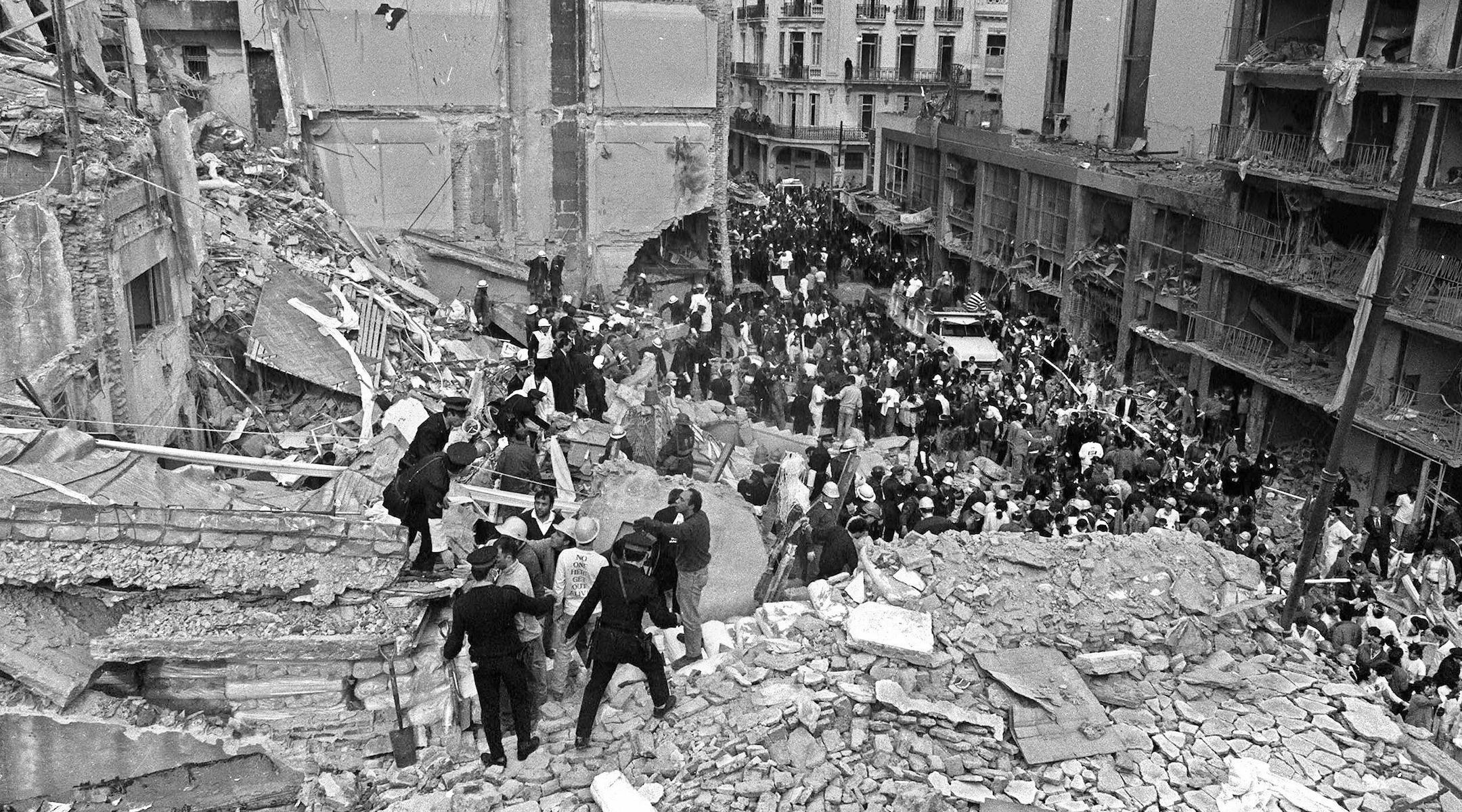The Argentine Jewish community was left reeling after a bomb ripped through its communal offices in Buenos Aires on Monday morning, wreaking death and havoc in the building and surrounding neighbor-hood.
“There is awful consternation and enormous confusion,” said a statement by representatives of the Latin American Jewish Congress, which is headquartered in Buenos Aires.
The blast completely leveled the seven-story building housing the Jewish Kehilla, or Jewish community organizations. At least 17 people were killed in the attack, and 127 injured, according to government officials.
The explosion took place as employees were arriving for work just before 10 a.m. local time. An estimated 100 people were inside the building at the time.
The death toll was expected to rise as workers sifted through the rubble. Among those killed were two police officers in a car stationed outside the building as a security measure.
The blast echoed the one that demolished the Israeli Embassy in Buenos Aires in March 1992.
No one was ever tried for that attack, which killed 30 and injured 250. At the time of that bombing, the Islamic Jihad in Beirut issued a statement claiming responsibility.
In this latest attack, a group calling itself Islamic Command called a local radio station to take responsibility.
Two foreigners were reportedly arrested in connection with the attack as they were trying to leave the country Monday, but Argentine officials declined to say whether they were members of any specific group.
ARGENTINE PRESIDENT APPEALS FOR CALM
Argentine President Carlos Menem had sealed the country’s borders in order to prevent the escape of any suspected bombers and had appealed on the airwaves for calm.
In Israel, Prime Minister Yitzhak Rabin called the attack “a cowardly, criminal, despicable act” and Foreign Minister Shimon Peres said, “We will do all we can to help those who have suffered in this attack.”
The blast cast a pall over the opening of talks between Israel and Jordan on Monday. U.S. Secretary of State Warren Christopher, in Israel, said the attack was a reminder that “there are still enemies of peace” throughout the world.
“We redouble our efforts,” he said, “while commiserating with the Jewish people in that terrible incident in Buenos Aires.”
Jordan also condemned the attack, as did the Palestine Liberation Organization.
The blast sent ripples of fear throughout the Argentine Jewish community of 220,000, the largest in South America, which had barely recovered from the 1992 attack on the embassy.
Observers noted the similarities between the two attacks, including the apparent use of car bombs in both incidents and the fact that each building was undergoing construction work when the blast occurred, with workers freely coming and going.
This time, the bomb struck one of the community’s most important addresses. The building housed the DAIA, the umbrella organization of Argentine Jewry; the AMIA, the community’s 100-year-old main social service agency for the poor and aged; a library of YIVO, the Jewish Research Institute, where the archives on Jewish life in Argentina are stored; and the Jewish Community Council, among other organizations.
“They are really frightened,” said Bernice Tannenbaum, coordinator of Hadassah International, who was in touch with her colleagues in Buenos Aires.
She said that “a call was made for complete silence in the area” so that any cries for help from under the debris could be detected.
Bernardo Zelcer, the Buenos Aires representative of the American Jewish Joint Distribution Committee, described the mood as laden with “much perplexity and much pain.”
Elan Steinberg, executive director of the World Jewish Congress in New York, said the Argentine government has called for three days of official mourning.
Steinberg also reported that leaders of the DAIA held a meeting late Monday with five government ministers at a secret location. “All indications point to Muslim fundamentalists,” he said, after speaking with participants in the meeting.
WJC faxed Jewish communal offices around the world urging them to take special precautions since the explosion appeared to be of terrorist origins. A spokesman for B’nai B’rith International said his group was doing the same.
In New York, the American Jewish Committee held a hastily arranged meeting with the visiting Argentine minister of the interior, Carlos Ruckauf.
The minister assured the Jewish leaders that a full investigation was under way, and that he would take personal control of those efforts when he returns home. He was scheduled to leave New York on Monday.
JTA has documented Jewish history in real-time for over a century. Keep our journalism strong by joining us in supporting independent, award-winning reporting.
The Archive of the Jewish Telegraphic Agency includes articles published from 1923 to 2008. Archive stories reflect the journalistic standards and practices of the time they were published.




